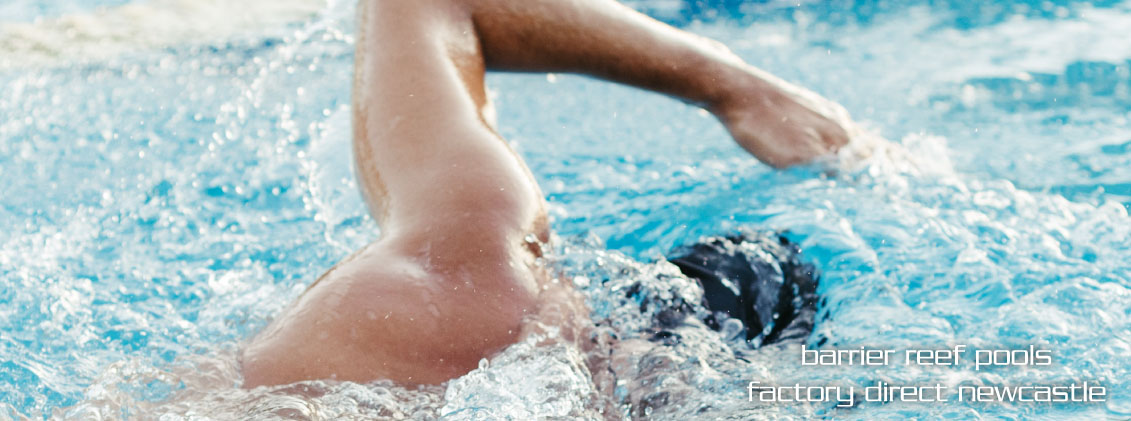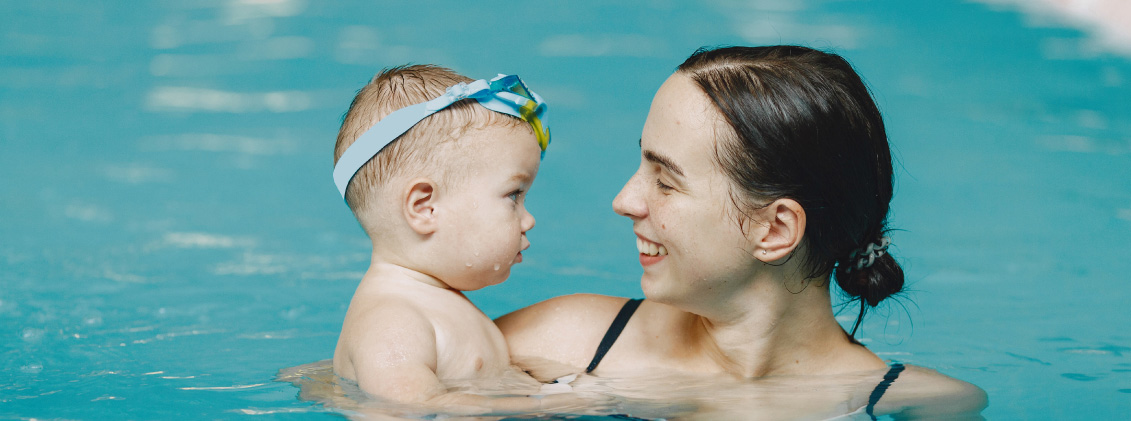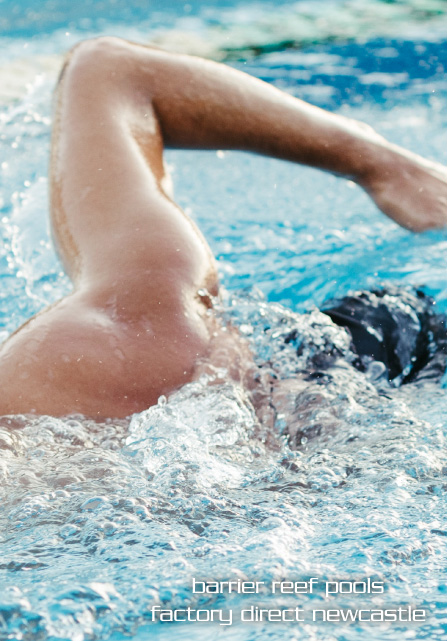Can Fibreglass Pools Be Heated?
When homeowners get a pool installed in their backyard, most of them do so with the intention of using it year-round. After all, why deprive yourself of the joy of a relaxing in warm pool during winter? Installing a heating system in your pool ensures you don't have to hibernate your pool under a pool cover during the colder months. But can you install a heating system in a fibreglass pool? The answer is a resounding yes! In fact, fibreglass swimming pools can be heated for a much lower price compared to other pool types. In this article, we'll share the different types of heating systems for your fibreglass pool and how to choose the right one for yourself.

Why Heat A Pool?
Before we begin, let’s address a common question that plagues the mind of most pool owners. “Why do we even need to heat our pools when we live in a sunny state with lots of sunshine?” We’ll tell you why. Even if you live in the warmest region of Australia, on the hottest of days your pool might reach 30 degrees. During winters, the temperature may fall by over 10 degrees.
Suppose, you live in a cooler region like Melbourne, during summer you can expect your pool temperature to be between 16 and 25 degrees. But here is the thing, most people want to use their pool for the whole year if they can.
No matter which state or territory of Australia you live in, your pool water requires a heating system. If you touch the pool’s surface, the water may feel warm enough for a swim. But when you enter the pool, you will realise it is cooler. This is because the sun’s rays don’t penetrate the pool’s surface. They can only make the pool surface warm, whereas, the water below is usually cooler by 3 degrees. For a spa-like experience, the water temperature needs to be around 29 degrees. A heating system can get your pool water to a comfortable temperature for a relaxing swim.
What Heating Systems Can I Choose From?
There are 3 main types of heating systems to choose from for your fibreglass pool:
Solar Heaters
Solar heaters harness the energy from the sun to heat your pool. They use solar panels that can be installed on your rooftop to absorb the sun’s heat and transfer it into the pool through the pool’s circulation system. As you might have guessed, for solar heaters to work at optimum capacity, you must be residing in an area that receives plenty of sunshine all year round.
Running Cost: Even though solar energy is free you will have to shell out money to pay for the electric pumps circulating your pool’s water. This can cost somewhere around $300 to $950 annually depending on your utility rates and the area you live in.
Installation Cost: Ideally, the area of your solar panels must be a minimum of half the pool’s surface area. So, the installation costs can be around $2,500 and $9,000.
Solar heaters are the most environmentally friendly option as they operate on free heat from the sun. They have a lifespan of 15 to 20 years. Plus, they result in huge cost savings in the long run and may make you eligible for a solar tax credit. A slight con of solar panels is their exorbitant initial outlay and longer installation times compared to other pool heaters. They work efficiently only where you have plenty of direct sunlight.

Electric Heat Pumps
Electric heat pumps work by reusing energy. They collect heat from the air and send it to your pool via a heat exchanger. They can be more efficient than solar panels as they are not dependent on the sun. Electric heat pumps can harness the power from the air even during nights or on overcast days. The air temperature must be at least 13 degrees to heat the pool water effectively. However, newer models with advanced technology can heat the pool with lower outdoor air temperatures as well.
Running cost: Depending on the model, electric heat pumps can cost around $50 and $100 monthly to operate. As you can see, they are one of the most cost-effective pool heating options.
Installation cost: The installation costs for electric heat pumps falls in the range of $2,000 and $7,000 and above. You can expect to save on monthly operating costs in the long run.
Electric heat pumps are energy-efficient and can prolong your swim season by many weeks. However, they may take longer to heat the pool compared to a gas pump. They also depend on the outdoor air temperature to operate optimally.
Gas Pumps
Pool owners living in colder regions prefer gas pumps to heat their pool. This is because gas pumps don’t depend on the energy of the sun or the warmth of the air to heat your pool. They use either propane or natural gas in a combustion chamber to generate heat and warm your pool. Depending upon the size of your pool, you can heat it within an hour. When you want to use your pool quickly, this is your best bet. Spas use gas pumps to maintain a comfortable temperature for therapy sessions, no matter the weather outside.
Running cost: Depending on whether you use natural gas or propane gas to heat your pool, the operating costs of gas pumps can vary. On average, the monthly costs can fall around $300 to $500.
Installation cost: Gas pumps are inexpensive to buy. For a smaller pool, they can start from $1,500 and go up to $6,000 for larger pools.
Out of the three heating systems, gas pumps are the best choice to heat the pool quickly any time of the day. However, they have a shorter lifespan (around 5 years) compared to their counterparts.

How Do I Decide Which Is The Best Heating System for My Pool?
Now that we have learned about the different pool heating systems, here is how you can make the right choice for your pool:
- Consider the size of your pool
- Know your budget before you finalise any option
- Factor in the amount of sunlight you get throughout the year
- Does your backyard have a lot of trees or do you live in a windy area?
- Decide how often do you want to use the pool
- Consider the climate in the region you live in
- Consider the reason for using the pool – relaxation, fitness or therapy?
- When you answer the above pointers, you can decide which pool heating system will work best for your pool.
Wrapping Up
To sum up, fibreglass pools can be heated using solar panels, electric heat pumps or gas pumps. Depending on your budget, location and other personal preferences you can choose the heating system that is well-suited to your pool.
We hope with this comprehensive guide you can make an informed decision for yourself. If you need any assistance, our friendly team of professional pool builders are here to help you. Get in touch with us for the latest in heating systems for your pool or other pool-related enquiries. We would be happy to answer all your questions.
Give us a call TODAY!
Can Fibreglass Pools Be Heated?
When homeowners get a pool installed in their backyard, most of them do so with the intention of using it year-round. After all, why deprive yourself of the joy of a relaxing in warm pool during winter? Installing a heating system in your pool ensures you don't have to hibernate your pool under a pool cover during the colder months. But can you install a heating system in a fibreglass pool? The answer is a resounding yes! In fact, fibreglass swimming pools can be heated for a much lower price compared to other pool types. In this article, we'll share the different types of heating systems for your fibreglass pool and how to choose the right one for yourself.

Why Heat A Pool?
Before we begin, let’s address a common question that plagues the mind of most pool owners. “Why do we even need to heat our pools when we live in a sunny state with lots of sunshine?” We’ll tell you why. Even if you live in the warmest region of Australia, on the hottest of days your pool might reach 30 degrees. During winters, the temperature may fall by over 10 degrees.
Suppose, you live in a cooler region like Melbourne, during summer you can expect your pool temperature to be between 16 and 25 degrees. But here is the thing, most people want to use their pool for the whole year if they can.
No matter which state or territory of Australia you live in, your pool water requires a heating system. If you touch the pool’s surface, the water may feel warm enough for a swim. But when you enter the pool, you will realise it is cooler. This is because the sun’s rays don’t penetrate the pool’s surface. They can only make the pool surface warm, whereas, the water below is usually cooler by 3 degrees. For a spa-like experience, the water temperature needs to be around 29 degrees. A heating system can get your pool water to a comfortable temperature for a relaxing swim.
What Heating Systems Can I Choose From?
There are 3 main types of heating systems to choose from for your fibreglass pool:
Solar Heaters
Solar heaters harness the energy from the sun to heat your pool. They use solar panels that can be installed on your rooftop to absorb the sun’s heat and transfer it into the pool through the pool’s circulation system. As you might have guessed, for solar heaters to work at optimum capacity, you must be residing in an area that receives plenty of sunshine all year round.
Running Cost: Even though solar energy is free you will have to shell out money to pay for the electric pumps circulating your pool’s water. This can cost somewhere around $300 to $950 annually depending on your utility rates and the area you live in.
Installation Cost: Ideally, the area of your solar panels must be a minimum of half the pool’s surface area. So, the installation costs can be around $2,500 and $9,000.
Solar heaters are the most environmentally friendly option as they operate on free heat from the sun. They have a lifespan of 15 to 20 years. Plus, they result in huge cost savings in the long run and may make you eligible for a solar tax credit. A slight con of solar panels is their exorbitant initial outlay and longer installation times compared to other pool heaters. They work efficiently only where you have plenty of direct sunlight.

Electric Heat Pumps
Electric heat pumps work by reusing energy. They collect heat from the air and send it to your pool via a heat exchanger. They can be more efficient than solar panels as they are not dependent on the sun. Electric heat pumps can harness the power from the air even during nights or on overcast days. The air temperature must be at least 13 degrees to heat the pool water effectively. However, newer models with advanced technology can heat the pool with lower outdoor air temperatures as well.
Running cost: Depending on the model, electric heat pumps can cost around $50 and $100 monthly to operate. As you can see, they are one of the most cost-effective pool heating options.
Installation cost: The installation costs for electric heat pumps falls in the range of $2,000 and $7,000 and above. You can expect to save on monthly operating costs in the long run.
Electric heat pumps are energy-efficient and can prolong your swim season by many weeks. However, they may take longer to heat the pool compared to a gas pump. They also depend on the outdoor air temperature to operate optimally.
Gas Pumps
Pool owners living in colder regions prefer gas pumps to heat their pool. This is because gas pumps don’t depend on the energy of the sun or the warmth of the air to heat your pool. They use either propane or natural gas in a combustion chamber to generate heat and warm your pool. Depending upon the size of your pool, you can heat it within an hour. When you want to use your pool quickly, this is your best bet. Spas use gas pumps to maintain a comfortable temperature for therapy sessions, no matter the weather outside.
Running cost: Depending on whether you use natural gas or propane gas to heat your pool, the operating costs of gas pumps can vary. On average, the monthly costs can fall around $300 to $500.
Installation cost: Gas pumps are inexpensive to buy. For a smaller pool, they can start from $1,500 and go up to $6,000 for larger pools.
Out of the three heating systems, gas pumps are the best choice to heat the pool quickly any time of the day. However, they have a shorter lifespan (around 5 years) compared to their counterparts.

How Do I Decide Which Is The Best Heating System for My Pool?
Now that we have learned about the different pool heating systems, here is how you can make the right choice for your pool:
- Consider the size of your pool
- Know your budget before you finalise any option
- Factor in the amount of sunlight you get throughout the year
- Does your backyard have a lot of trees or do you live in a windy area?
- Decide how often do you want to use the pool
- Consider the climate in the region you live in
- Consider the reason for using the pool – relaxation, fitness or therapy?
- When you answer the above pointers, you can decide which pool heating system will work best for your pool.
Wrapping Up
To sum up, fibreglass pools can be heated using solar panels, electric heat pumps or gas pumps. Depending on your budget, location and other personal preferences you can choose the heating system that is well-suited to your pool.
We hope with this comprehensive guide you can make an informed decision for yourself. If you need any assistance, our friendly team of professional pool builders are here to help you. Get in touch with us for the latest in heating systems for your pool or other pool-related enquiries. We would be happy to answer all your questions.
Give us a call TODAY!



